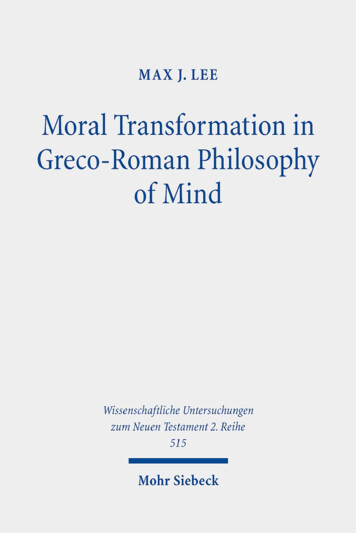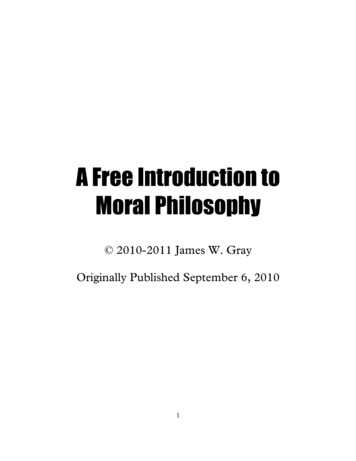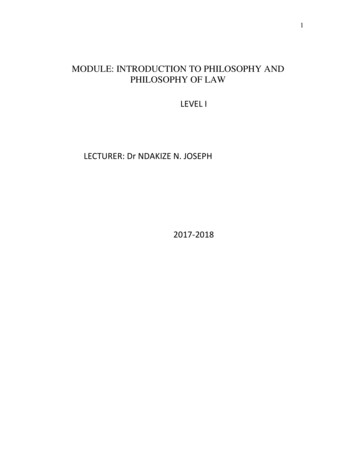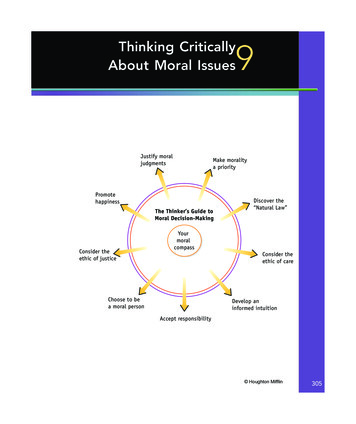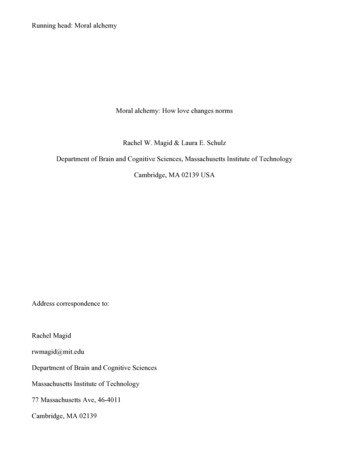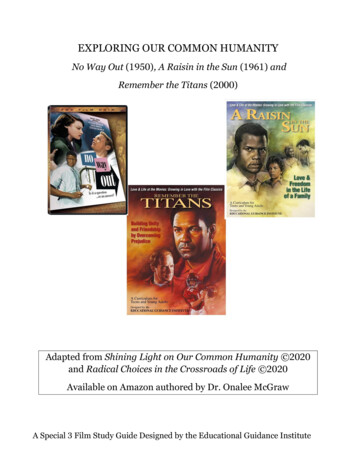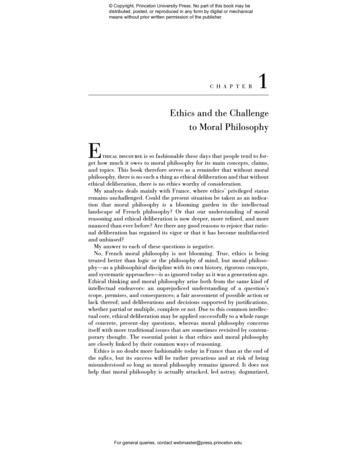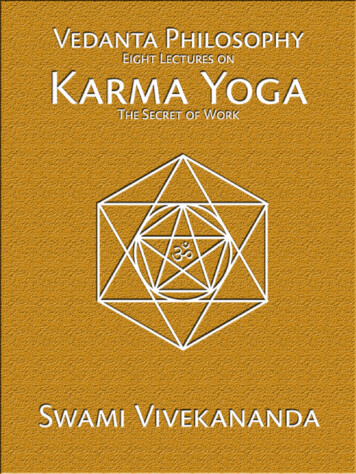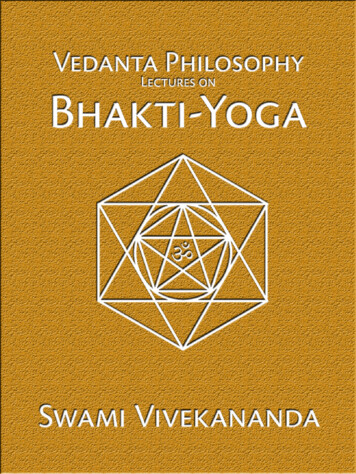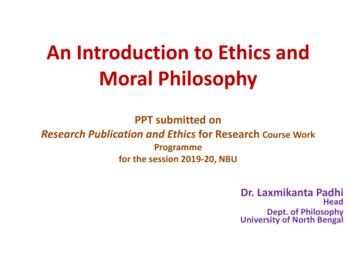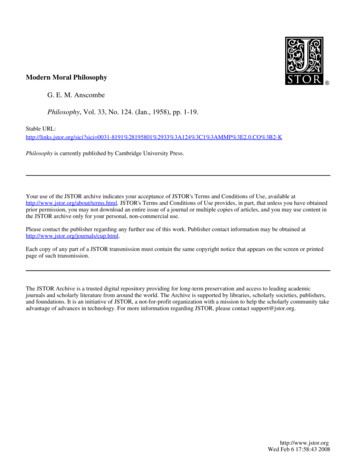
Transcription
Modern Moral PhilosophyG. E. M. AnscombePhilosophy, Vol. 33, No. 124. (Jan., 1958), pp. 1-19.Stable URL:http://links.jstor.org/sici?sici B2-KPhilosophy is currently published by Cambridge University Press.Your use of the JSTOR archive indicates your acceptance of JSTOR's Terms and Conditions of Use, available athttp://www.jstor.org/about/terms.html. JSTOR's Terms and Conditions of Use provides, in part, that unless you have obtainedprior permission, you may not download an entire issue of a journal or multiple copies of articles, and you may use content inthe JSTOR archive only for your personal, non-commercial use.Please contact the publisher regarding any further use of this work. Publisher contact information may be obtained athttp://www.jstor.org/journals/cup.html.Each copy of any part of a JSTOR transmission must contain the same copyright notice that appears on the screen or printedpage of such transmission.The JSTOR Archive is a trusted digital repository providing for long-term preservation and access to leading academicjournals and scholarly literature from around the world. The Archive is supported by libraries, scholarly societies, publishers,and foundations. It is an initiative of JSTOR, a not-for-profit organization with a mission to help the scholarly community takeadvantage of advances in technology. For more information regarding JSTOR, please contact support@jstor.org.http://www.jstor.orgWed Feb 6 17:58:43 2008
PHILOSOPHYTHE JOURNAL OF T H E ROYAL I N S T I T U T EOF PHILOSOPHYJAXUARY 1958VOL.XXXIII. No. 124MODERN MORAL PHILOSOPHY'G . E. M. ANSCOMBEI WILL begin by stating three theses which I present in this paper.The first is that it is not profitable for us at present to do moralphilosophy; that should be laid aside at any rate until we have anadequate philosophy of psychology, in which we are conspicuouslylacking. The second is that the concepts of obligation, and dutymoral obligation and moral duty, that is to say-and of what ismorally right and wrong, and of the moral sense of "ought," ought tobe jettisoned if this is psychologically possible; because they aresurvivals, or derivatives from survivals, from an earlier conception ofethics which no longer generally survives, and are only harmfulwithout it. My third thesis is that the differences between the wellknown English writers on moral philosophy from Sidgwick to thepresent day are of little importance.Anyone who has read Aristotle's Ethics and has also read modernmoral philosophy must have been struck by the great contrastsbetween them. The concepts which are prominent among the modernsseem to be lacking, or a t any rate buried or far in the background,in Aristotle. Most noticeably, the term "moral" itself, which we haveby direct inheritance from Aristotle, just doesn't seem to fit, in itsmodern sense, into an account of Aristotelian ethics. Aristotle distinguishes virtues as moral and intellectual. Have some of what he calls"intellectual" virtues what we should call a "moral" aspect? It wouldseem so; the criterion is presumably that a failure in an "intellectualJ'virtue-like that of having good judgment in calculating how tobring about something useful, say in municipal government-may beblameworthy. But-it may reasonably be asked-cannot any failurebe made a matter of blame or reproach? Any derogatory criticism,say of the workmanship of a product or the design of a machine, canbe called blame or reproach. So we want to put in the word "morally"IThis paper was originally read to the Voltaire Society in Oxford.
PHILOSOPHYagain: sometimes such a failure may be morally blameworthy, sometimes not. Now has Aristotle got this idea of moral blame, as opposedto any other? If he has, why isn't it more central? There are somemistakes, he says, which are causes, not of involuntariness in actions,but of scoundrelism, and for which a man is blamed. Does this meanthat there is a moral obligation not to make certain intellectualmistakes? Why doesn't he discuss obligation in general, and thisobligation in particular? If someone professes to be expoundingAristotle and talks in a modern fashion about "moral" such-and-such,he must be very imperceptive if he does not constantly feel like someone whose jaws have somehow got out of alignment: the teeth don'tcome together in a proper bite.We cannot, then, look to Aristotle for any elucidation of the modernway of talking about "moral" goodness, obligation, etc. And all thebest-known writers on ethics in modern times, from Butler to Mill,appear to me to have faults as thinkers on the subject which make itimpossible to hope for any direct light on it from them. I will statethese objections with the brevity which their character makespossible.Butler exalts conscience, but appears ignorant that a man'sconscience may tell him to do the vilest things.Hume defines "truth" in such a way as to exclude ethical judgmentsfrom it, and professes that he has proved that they are so excluded.He also implicitly defines "passion" in such a way that aiming atanything is having a passion. His objection to passing from "is" to"oughtJ' would apply equally to passing from "is" to "owes" or from"is" to "needs." (However, because of the historical situation, he hasa point here, which I shall return to.)Kant introduces the idea of "legislating for oneself," which is asabsurd as if in these days, when majority votes command greatrespect, one were to call each reflective decision a man made a voteresulting in a majority, which as a matter of proportion is overwhelming, for it is always 1-0. The concept of legislation requiressuperior power in the legislator. His own rigoristic convictions on thesubject of lying were so intense that it never occurred to him that alie could be relevantly described as anything but just a lie (e.g. as "alie in such-and-such circumstances"). His rule about universalizablemaxims is useless without stipulations as to what shall count as arelevant description of an action with a view to constructing a maximabout it.Bentham and Mill do not notice the difficulty of the conceptbe pleasure." They are often said to have gone wrong through committing the "naturalistic fallacy"; but this charge does not impress me,because I do not find accounts of it coherent. But the other pointabout pleasure-seems to me a fatal objection from the very outset.2
MODERN MORAL PHILOSOPHYThe ancients found this concept pretty baffling. I t reduced Aristotleto sheer babble about "the bloom on the cheek of youth" because,for good reasons, he wanted to make it out both identical with anddifferent from the pleasurable activity. Generations of modernphilosophers found this concept quite unperplexing, and it reappearedin the literature as a problematic one only a year or two ago when Rylewrote about it. The reason is simple: since Locke, pleasure was takento be some sort of internal impression. But it was superficial, if thatwas the right account of it, to make it the point of actions. One mightadapt something Wittgenstein said about "meaning" and say"Pleasure cannot be an internal impression, for no internal impressioncould have the consequences of pleasure."Mill also, like Kant, fails to realize the necessity for stipulation asto relevant descriptions, if his theory is to have content. I t did notoccur to him that acts of murder and theft could be otherwisedescribed. He holds that where a proposed action is of such a kind asto fall under some one principle established on grounds of utility,one must go by that; where it falls under none or several, the severalsuggesting contrary views of the action, the thing to do is to calculateparticular consequences. But pretty well any action can be so described as to make it fall under a variety of principles of utility (as Ishall say for short) if it falls under any.I will now return to Hume. The features of Hume's philosophywhich I have mentioned, like many other features of it, would inclineme to think that Hume was a mere-brilliant-sophist;and hisprocedures are certainly sophistical. But I am forced, not to reverse,but to add to, this judgment by a peculiarity of Hume's philosophizing: namely that although he reaches his conclusions-with whichhe is in love-by sophistical methods, his considerations constantlyopen up very deep and important problems. I t is often the case thatin the act of exhibiting the sophistry one finds oneself noticing matterswhich deserve a lot of exploring: the obvious stands in need ofinvestigation as a result of the points that Hume pretends to havemade. In this, he is unlike, say, Butler. I t was already well knownthat conscience could dictate vile actions; for Butler to have writtendisregarding this does not open up any new topics for us. But withHume it is otherwise: hence he is a very profound and greatphilosopher, in spite of his sophistry. For example:Suppose that I say to my grocer "Truth consists in either relationsof ideas, as that 20s. EI, or matters of fact, as that I orderedpotatoes, you supplied them, and you sent me a bill. So it doesn'tapply to such a proposition as that I owe you such-and-such a sum."Now if one makes this comparison, it comes to light that the relation of the facts mentioned to the description "X owes Y so muchmoney" is an interesting one, which I will call that of being "brute3
PHILOSOPHYrelative to" that description. Further, the "brute" facts mentionedhere themselves have descriptions relatively to which other facts are"brutew-as, e.g., he had potatoes carted to my house and they wereleft there are brute facts relative to "he supplied me with potatoes."And the fact X owes Y money is in turn "brute" relative to"X is solvent." Now the relation ofother descriptions-e.g."relative bruteness" is a complicated one. To mention a few points:if xyz is a set of facts brute relative to a description A, then xyz is aset out of a range some set among which holds if A holds; but theholding of some set among these does not necessarily entail A,because exceptional circumstances can always make a difference; andwhat are exceptional circumstances relatively to A can generally onlybe explained by giving a few diverse examples, and no theoreticallyadequate provision can be made for exceptional circumstances, sincea further special context can theoretically always be imagined thatwould reinterpret any special context. Further, though in normalcircumstances, xyz would be a justification for A, that is not to saythat A just comes to the same as "xyz"; and also there is apt to bean institutional context which gives its point to the description A, ofwhich institution A is of course not itself a description. (E.g. thestatement that I give someone a shilling is not a description of theinstitution of money or of the currency of this country.) Thus, thoughit would be ludicrous to pretend that there can be no such thing asa transition from, e.g., "is" to "owes," the character of the transitionis in fact rather interesting and comes to light as a result of reflectingon Hume's arguments.'That I owe the grocer such-and-such a sum would be one of a setof facts which would be "brute" in relation to the description "I ama bilker." "Bilking" is of course a species of "dishonesty" or "injustice." (Naturally the consideration will not have any effect on myactions unless I want to commit or avoid acts of injustice.)So far, in spite of their strong associations, I conceive "bilking,""injustice" and "dishonesty" in a merely "factual" way. That I cando this for "bilking" is obvious enough; "justice" I have no idea howto define, except that its sphere is that of actions which relate tosomeone else, but "injustice," its defect, can for the moment beoffered as a generic name covering various species. E.g.: "bilking,""theft" (which is relative to whatever property institutions exist),"slander," "adultery," "punishment of the innocent."In present-day philosophy an explanation is required how anunjust man is a bad man, or an unjust action a bad one; to give suchan explanation belongs to ethics; but it cannot even be begun until weare equipped with a sound philosophy of psychology. For the proofI The above two paragraphs are an abstract of a paper "On Brute Facts"forthcoming in Analysis.4
MODERN MORAL PHILOSOPHYthat an unjust man is a bad man would require a positive account ofjustice as a "virtue." This part of the subject-matter of ethics is,however, completely closed to us until we have an account of whattype of characteristic a virtue is-a problem, not of ethics, but ofconceptual analysis-and how it relates to the actions in which it isinstanced: a matter which I think Aristotle did not succed in reallymaking clear. For this we certainly need an account at least of whata human action is a t all, and how its description as "doing such-andsuch" is affected by its motive and by the intention or intentions init; and for this an account of such concepts is required.The terms "should" or "ought" or "needs" relate to good and bad:e.g. machinery needs oil, or should or ought to be oiled, in that runningwithout oil is bad for it, or it runs badly without oil. According tothis conception, of course, "should" and "ought" are not used in aspecial "moral" sense when one says that a man should not bilk. (InAristotle's sense of the term "moral" ( 4 e . dthey ) , are being usedin connection with a moral subject-matter: namely that of humanpassions and (non-technical) actions.) But they have now acquired aspecial so-called "moral" sense-i.e. a sense in which they imply someabsolute verdict (like one of guilty / not guilty on a man) on what isdescribed in the "ought" sentences used in certain types of context:not merely the contexts that Aristotle would call "moral"-passionsand actions-but also some of the contexts that he would call"intellectual."The ordinary (and quite indispensable) terms "should," "needs,""ought," "must"-acquiredthis special sense by being equated inthe relevant contexts with "is obliged," or "is bound," or "is requiredto," in the sense in which one can be obliged or bound by law, orsomething can be required by law.How did this come about? The answer is in history: betweenAristotle and us came Christianity, with its law conception of ethics.For Christianity derived its ethical notions from the Torah. (Onemight be inclined to think that a law conception of ethics could ariseonly among people who accepted an allegedly divine positive law;that this is not so is shown by the example of the Stoics, who alsothought that whatever was involved in conformity to human virtueswas required by divine law.)In consequence of the dominance of Christianity for many centuries, the concepts of being bound, permitted, or excused becamedeeply embedded in our language and thought. The Greek worda p a p v vthe, " aptest to be turned to that use, acquired the sense"sin," from having meant "mistake," "missing the mark," "goingwrong." The Latin peccatum which roughly corresponded to i , u & was even apterafor the sense "sin," because it was alreadyassociated with "culpa"--"guilt"-ajuridical notion. The blanketI ,I5
PHILOSOPHYterm "illicit," "unlawful," meaning much the same as our blanketterm "wrong," explains itself. I t is interesting that Aristotle did nothave such a blanket term. He has blanket terms for wickedness"villain," "scoundrel"; but of course a man is not a villain or ascoundrel by the performance of one bad action, or a few bad actions.And he has terms like "disgraceful," "impious"; and specific termssignifying defect of the relevant virtue, like "unjust"; but no termcorresponding to "illicit." The extension of this term (i.e. the rangeof its application) could be indicated in his terminology only by aquite lengthy sentence: that is "illicit" which, whether it is a thoughtor a consented-to passion or an action or an omission in thought oraction, is something contrary to one of the virtues the lack of whichshows a man to be bad qua man. That formulation would yield aconcept co-extensive with the concept "illicit."To have a law conception of ethics is to hold that what is neededfor conformity with the virtues failure in which is the mark of beingbad qua man (and not merely, say, qua craftsman or logician)-thatwhat is needed for this, is required by divine law. Naturally it is notpossible to have such a conception unless you believe in God as a lawgiver; like Jews, Stoics, and Christians. But if such a conception isdominant for many centuries, and then is given up, it is a naturalresult that the concepts of "obligation," of being bound or requiredas by a law, should remain though they had lost their root; and if theword "ought" has become invested in certain contexts with the senseof "obligation," it too will remain to be spoken with a special emphasisand a special feeling in these contexts.I t is as if the notion "criminal" were to remain when criminal lawand criminal courts had been abolished and forgotten. A Humediscovering this situation might conclude that there was aspecial sentiment, expressed by "criminal," which alone gave theword its sense. So Hume discovered the situation in which the notion"obligation" survived, and the notion "ought" was invested withthat peculiar force having which it is said to be used in a "moral"sense, but in which the belief in divine law had long since been abandoned: for it was substantially given up among Protestants at thetime of the reformation. The situation, if I am right, was theinteresting one of the survival of a concept outside the framework ofthought that made it a really intelligible one.When Hume produced his famous remarks about the transitionI They did not deny the existence of divine law; but their most characteristic doctrine was that it was given, not to be obeyed, but to show man'sincapacity to obey it, even by grace; and this applied not merely to the ramifiedprescriptions of the Torah, but to the requirements of "natural divine law."Cf. in this connection the decree of Trent against the teaching that Christwas only to be trusted in as mediator, not obeyed as legislator,6
MODERN MORAL P H I L O S O P H Yfrom "is" to "ought," he was, then, bringing together several quitedifferent points. One I have tried to bring out by my remarks on thetransition from "is" to "owes" and on the relative "bruteness" offacts. I t would be possible to bring out a different point by enquiringabout the transition from "is" to "needsJ'; from the characteristicsof an organism to the environment that it needs, for example. To saythat it needs that environment is not to say, e.g., that you want it tohave that environment, but that it won't flourish unless it has it.Certainly, it all depends whether you want it to flourish! as Humewould say. But what "all depends" on whether you want it to flourishis whether the fact that it needs that environment, or won't flourishwithout it, has the slightest influence on your actions, Now that suchand-such "ought" to be or "is needed" is supposed to have an influenceon your actions: from which it seemed natural to infer that to judgethat it "ought to be" was in fact to grant what you judged "ought tobe" influence on your actions. And no amount of truth as to what i sthe case could possibly have a logical claim to have influence on youractions. (It is not judgment as such that sets us in motion; but ourjudgment on how to get or do something we want.) Hence it must beimpossible to infer "needs" or "ought to be" from "is." But in thecase of a plant, let us say, the inference from "is" to "needs" iscertainly not in the least dubious. I t is interesting and worthexamining; but not at all fishy. Its interest is similar to the interest ofthe relation between brute and less brute facts: these relations havebeen very little considered. And while you can contrast "whatit needs" with "what it's gotH-like contrasting de facto and deizwe-that does not make its needing this environment less of a"truth."Certainly in the case of what the plant needs, the thought of a needwill only affect action if you want the plant to flourish. Here, then,there is no necessaryconnection betweenwhat you can judge the plant"needs" and what you want. But there is some sort of necessaryconnection between what you think you need, and what you want.The connection is a complicated one; it is possible not to want something that you judge you need. But, e.g., it is not possible never towant anything that you judge you need. This, however, is not a factabout the meaning of the word "to need," but about the phenomenonof wanting. Hume's reasoning, we might say, in effect, leads one tothink it must be about the word "to need," or "to be good for."Thus we find two problems already wrapped up in the remark abouta transition from "is" to "ought"; now supposing that we had clarifiedthe "relative bruteness" of facts on the one hand, and the notionsinvolved in "needing," and "flourishing" on the other-there wouldstill remain a third point. For, following Hume, someone might say:Perhaps you have made out your point about a transition from "is"7
PHILOSOPHYto "owes" and from "is" to "needs": but only at the cost of showing"owes" and "needs" sentences to express a kind of truths, a kindof facts. And it remains impossible to infer "morally ought" from "is"sentences.This comment, it seems to me, would be correct. Thisword"ought,"having become a word of mere mesmeric force, could not, in thecharacter of having that force, be inferred from anything whatever.I t may be objected that it could be inferred from other "morallyought" sentences: but that cannot be true. The appearance that thisis so is produced by the fact that we say "All men are 4" and "Socrates is a man" implies "Socrates is ." But here "4" is a dummypredicate. 'Eve mean that if you substitute a real predicate for "4"the implication is valid. A real predicate is required; not just a wordcontaining no intelligible thought: a word retaining the suggestion offorce, and apt to have a strong psychological effect, but which nolonger signifies a real concept at all.For its suggestion is one of a verdict on my action, according as itagrees or disagrees with the description in the "ought" sentence. Andwhere one does not think there is a judge or a law, the notion of averdict may retain its psychological effect, but not its meaning. Nowimagine that just this word "verdict" were so used-with a characteristically solemn emphasis-as to retain its atmosphere but not itsmeaning, and someone were to say: "For a verdict, after all, you needa law and a judge." The reply might be made: "Not at all, for if therewere a law and a judge who gave a verdict, the question for us wouldbe whether accepting that verdict is something that there is a Verdicton." This is an analogue of an argument which is so frequentlyreferred to as decisive: If someone does have a divine law conceptionof ethics, all the same, he has to agree that he has to have a judgmentthat he ought (morally ought) to obey the divine law; so his ethic isin exactly the same position as any other: he merely has a "practicalmajor premise" : "Divine law ought to be obeyed" where someoneelse has, e.g., "The greatest happiness principle ought to be employedin all decisions."I should judge that Hume and our present-day ethicists had donea considerable service by showing that no content could be found inthe notion "morally ought"; if it were not that the latter philosopherstry to find an alternative (very fishy) content and to retain thepsychological force of the term. I t would be most reasonable to dropit. I t has no reasonable sense outside a law conception of ethics; theyare not going to maintain such a conception; and you can do ethicswithout it, as is shown by the example of Aristotle. I t would be a1 As it is absurdly called. Since nlajor premise premise containing the termwhich is predicate in the conclusion, it is a solecism t o speak of it in the connection with practical reasoning.8
MODERN MORAL PHILOSOPHYgreat improvment if, instead of "morally wrong," one always nameda genus such as "untruthful," "unchaste," "unjust." We should nolonger ask whether doing something was "wrong," passing directlyfrom some description of an action to this notion; we should askwhether, e.g., it was unjust; and the answer would sometimes be clearat once.I now come to the epoch in modern English moral philosophymarked by Sidgwick. There is a startling change that seems to havetaken place betweeen Mill and Moore. Mill assumes, as we saw, thatthere is no question of calculating the particular consequences of anaction such as murder or theft; and we saw too that his position wasstupid, because it is not at all clear how an action can fall under justone principle of utility. In Moore and in subsequent academicmoralists of England we find it taken to be pretty obvious that "theright action" is the action which produces the best possible consequences (reckoning among consequences the intrinsic values ascribedto certain kinds of act by some "Objectivists" ).Now it follows fromthis that a man does well, subjectively speaking, if he acts for the bestin the particular circumstances according to his judgment of the totalconsequences of this particular action. I say that this follows, notthat any philosopher has said precisely that. For discussion of thesequestions can of course get extremely complicated: e.g. it can bedoubted whether "such-and-such is the right action" is a satisfactoryformulation, on the grounds that things have to exist to have predicates-so perhaps the best formulation is "I am obliged"; or again, aphilosopher may deny that "rightJ' is a "descriptive" term, and thentake a roundabout route through linguistic analysis to reach a viewwhich comes to the same thing as "the right action is the one productive of the best consequencesJ' (e.g. the view that you frame your"principles" to effect the end you choose to pursue, the connexionbetween "choice" and "best" being supposedly such that choosingreflectively means that you choose how to act so as to produce thebest consequences); further, the roles of what are called "moralprinciples'' and of the "motive of duty" have to be described; thedifferences between "good" and "morally good" and "rightJ' need tobe explored, the special characteristics of "ought" sentences investigated. Such discussions generate an appearance of significant diversityof views where what is really significant is an overall similarity. Theoverall similarity is made clear if you consider that every one of the* Oxford Objectivists of course distinguish between "consequences" and"intrinsic values" and so produce a misleading appearance of not being "consequentialists." But they do not hold-and Ross explicitly denies-that thegravity of, e.g., procuring th.e condemnation of the innocent is such that it cannot be outweighed by, e.g., national interest. Hence their distinction is of noimportance,9
PHILOSOPHYbest known English academic moral philosophers has put out aphilosophy according to which, e.g., it is not possible to hold that itcannot be right to kill the innocent as a means to any end whatsoeverand that someone who thinks otherwise is in error. (I have to mentionboth points; because Mr. Hare, for example, while teaching a philosophy which would encourage a person to judge that killing theinnocent would be what he "ought" to choose for over-riding purposes,would also teach, I think, that if a man chooses to make avoiding killing the innocent for any purpose his "supreme practical principle," hecannot be impugned for error: that just is his "principle." But withthat qualification, I think it can be seen that the point I have mentionedholds good of every single English academic moral philosopher sinceSidgwick.) Now this is a significant thing: for it means that all thesephilosophies are quite incompatible with the Hebrew-Christian ethic.For it has been characteristic of that ethic to teach that there arecertain things forbidden whatever conseqzLences threaten, such as:choosing to kill the innocent for any purpose, however good; vicariouspunishment; treachery (by which I mean obtaining a man's confidence in a grave matter by promises of trustworthy friendship andthen betraying him to his enemies); idolatry; sodomy; adultery;making a false profession of faith. The prohibition of certain thingssimply in virtue of their description as such-and-such identifiablekinds of action, regardless of any further consequences, is certainlynot the whole of the Hebrew-Christian ethic; but it is a noteworthyfeature of it; and if every academic philosopher since Sidgwick haswritten in such a way as to exclude this ethic, it would argue a certainprovinciality of mind not to see this incompatibility as the mostimportant fact about these philosophers, and the differences betweenthem as somewhat trifling by comparison.I t is noticeable that none of these philosophers displays anyconsciousness that there is such an ethic, which he is contradicting:it is pretty well taken for obvious among them all that a prohibitionsuch as that on murder does not operate in face of some consequences.But of course the strictness of the prohibition has as its point that y o uare not to be tempted b y fear or hope of consequences.If you notice the transition from Mill to Moore, you will suspectthat it was made somewhere by someone; Sidgwick will come to mindas a likely name; and you will in fact find it going on, almost casually,in him. He is rather a dull author; and the important things in himoccur in asides and footnotes and small bits of argument which arenot concerned with his grand classification of the "methods of ethics."A divine law theory of ethics is reduced to an insignificant variety bya footnote telling us that "the best theologians" (God knows whomhe meant) tell us that God is to be obeyed in his capa
left there are brute facts relative to "he supplied me with potatoes." And the fact X owes Y money is in turn "brute" relative to other descriptions-e.g. "X is solvent." Now the relation of "relative bruteness" is a complicated one. To mention a few points: if xyz is a set of facts brute relative to a description A, then xyz is a

